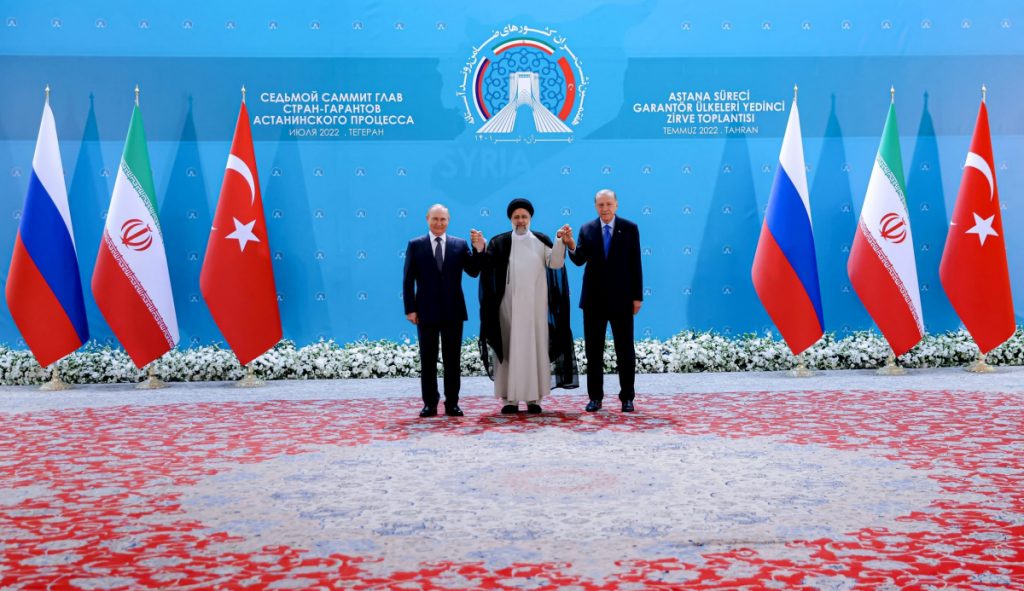Australia/Israel Review
Countering the emerging Russia-Turkey-Iran alliance
Aug 5, 2022 | Amir Avivi

Less than a week after US President Joe Biden left the Middle East following a visit that focused on the informal Israeli-Sunni Arab alliance in the region, Russian President Vladimir Putin boarded a plane to Iran, the leader of the opposing Shi’ite axis. Turkish President Recep Tayyip Erdogan joined the summit in Teheran.
The three regimes represented in Teheran are not friends of the West. Russia is engaged in a brutal war against Ukraine and dishes out threats to European countries on a weekly basis. Iran funds terrorist proxies across the Middle East, has a robust nuclear weapons project, and has stated many times that it seeks the complete annihilation of the United States and Israel. Finally, Turkey has proven itself an unreliable partner of the West on core issues such as sanctions on Russia, use of Russian defence systems, support for malign Iranian activities and more.
Putin’s summit has worrying implications for the Middle East. It appears that an anti-American alliance is forming at the behest of Russia and China, and it includes Iran and its terrorist proxies. As a result, Iran could soon find itself comfortably exporting oil and weapons and attracting foreign investments, despite Western sanctions. It might well become self-sufficient within its bloc of allies, leaving the West unable to pressure Iran on its nuclear program and other malfeasances.
US National Security Advisor Jake Sullivan revealed recently that Iran already feels emboldened enough to send sophisticated weapons systems to Russia. Putin said last week in Teheran that Russia-Iran relations “are developing at a good pace,” adding that the countries can “boast of record figures in terms of trade growth, including the strengthening of cooperation on international security issues.”
Such statements are made by leaders who are completely undeterred by the West.
When asked about the possibility of advanced Iranian weapons being sold to Russia, US Defense Secretary Lloyd Austin said, “We would advise Iran to not do that.” He added: “We think that’s a really, really bad idea.”
This is not enough. When Iran is emboldened enough to transfer sophisticated unmanned aerial vehicles (UAVs) to Russia and attempt to bring Turkey into its orbit, the West must see Iran for what it is and what it is attempting to do: conquer the region in the name of the Islamic revolution. Iranian leaders say this on a daily basis. We need only listen.
Iran must be made to understand that it cannot continue to expand its influence and aggression in the region, detach Turkey from the Western orbit or find new ways to evade Western sanctions. Right now, it seems that, even if these messages are being sent by the West, Teheran doesn’t particularly care.
The best way to make Iran care is by creating a strong and concrete alliance against the axis Iran is attempting to build. The US is already the leader of the bloc opposing Iran, and it must do all it can, in cooperation with its many allies, to stop Iran’s aggression in the region, as well as its nuclear program.
Finally, just like Eastern European countries faced with Russian aggression in their region, Israel cannot be expected to remain passive in the face of Iranian aggression in the Middle East. Israel must be prepared to use all means at its disposal to stop this aggression and ensure its own security.
Brig. Gen. (Res.) Amir Avivi is the founder and CEO of the Israel Defense and Security Forum (IDSF). The IDSF promotes research, education and policy focused on Israel’s security as a cornerstone of its existence. © Jewish News Syndicate (JNS.org), reprinted by permission, all rights reserved.
Tags: Iran, Middle East, Russia, Turkey






